The Impact of Entrepreneurship on Economic Development
VerifiedAdded on 2020/10/22
|17
|5341
|285
AI Summary
This assignment provides an in-depth analysis of the impact of entrepreneurship on economic development. It examines the role of entrepreneurship in driving innovation, creating jobs, and stimulating economic growth. The document also discusses the importance of business incubators and international networks in supporting entrepreneurial ventures. Overall, this assignment offers a comprehensive understanding of the relationship between entrepreneurship and economic development.
Contribute Materials
Your contribution can guide someone’s learning journey. Share your
documents today.

Qualification Unit number and title
Unit 9 Entrepreneurship and
Small Business
Management (level: 4)
Lecturer declaration
I certify that the work submitted for this
assignment is complete and appears
appropriate for marking.
Where work is not deemed complete or
suitable for marking, please identify
issues and any further deadlines.
Lecturer name:
Lecture signature: Date:
Unit 9 Entrepreneurship and
Small Business
Management (level: 4)
Lecturer declaration
I certify that the work submitted for this
assignment is complete and appears
appropriate for marking.
Where work is not deemed complete or
suitable for marking, please identify
issues and any further deadlines.
Lecturer name:
Lecture signature: Date:
Secure Best Marks with AI Grader
Need help grading? Try our AI Grader for instant feedback on your assignments.
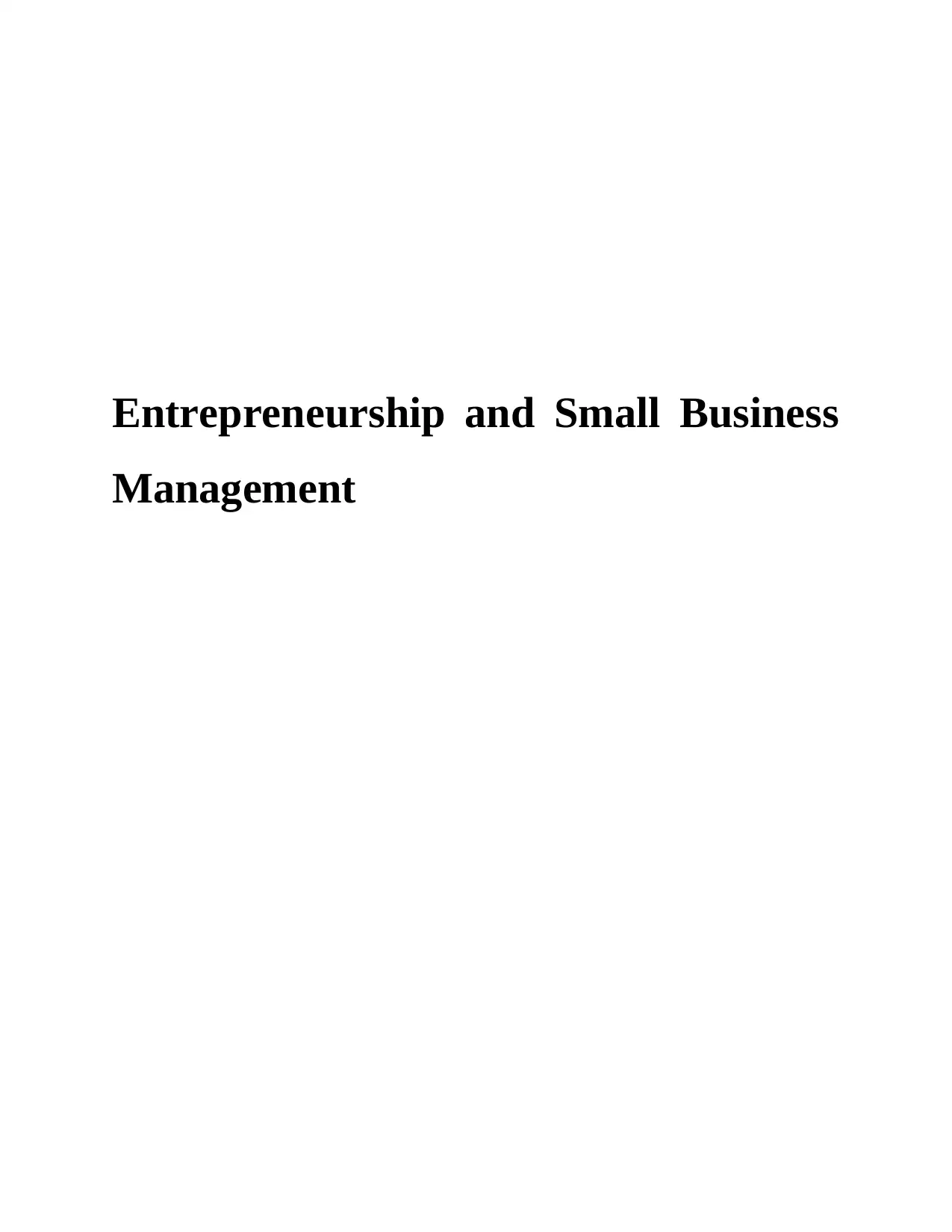
Entrepreneurship and Small Business
Management
Management
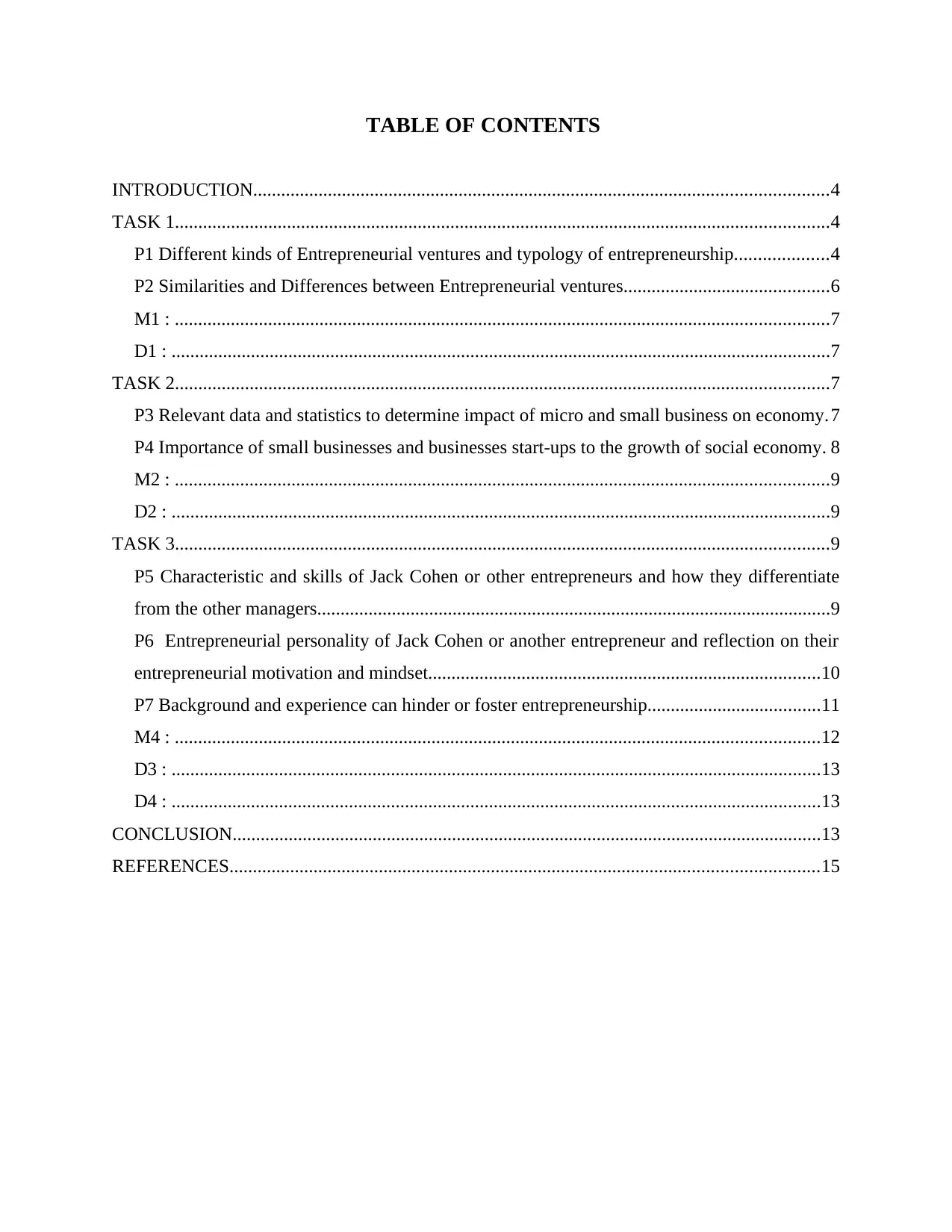
TABLE OF CONTENTS
INTRODUCTION...........................................................................................................................4
TASK 1............................................................................................................................................4
P1 Different kinds of Entrepreneurial ventures and typology of entrepreneurship....................4
P2 Similarities and Differences between Entrepreneurial ventures............................................6
M1 : ............................................................................................................................................7
D1 : .............................................................................................................................................7
TASK 2............................................................................................................................................7
P3 Relevant data and statistics to determine impact of micro and small business on economy.7
P4 Importance of small businesses and businesses start-ups to the growth of social economy. 8
M2 : ............................................................................................................................................9
D2 : .............................................................................................................................................9
TASK 3............................................................................................................................................9
P5 Characteristic and skills of Jack Cohen or other entrepreneurs and how they differentiate
from the other managers..............................................................................................................9
P6 Entrepreneurial personality of Jack Cohen or another entrepreneur and reflection on their
entrepreneurial motivation and mindset....................................................................................10
P7 Background and experience can hinder or foster entrepreneurship.....................................11
M4 : ..........................................................................................................................................12
D3 : ...........................................................................................................................................13
D4 : ...........................................................................................................................................13
CONCLUSION..............................................................................................................................13
REFERENCES..............................................................................................................................15
INTRODUCTION...........................................................................................................................4
TASK 1............................................................................................................................................4
P1 Different kinds of Entrepreneurial ventures and typology of entrepreneurship....................4
P2 Similarities and Differences between Entrepreneurial ventures............................................6
M1 : ............................................................................................................................................7
D1 : .............................................................................................................................................7
TASK 2............................................................................................................................................7
P3 Relevant data and statistics to determine impact of micro and small business on economy.7
P4 Importance of small businesses and businesses start-ups to the growth of social economy. 8
M2 : ............................................................................................................................................9
D2 : .............................................................................................................................................9
TASK 3............................................................................................................................................9
P5 Characteristic and skills of Jack Cohen or other entrepreneurs and how they differentiate
from the other managers..............................................................................................................9
P6 Entrepreneurial personality of Jack Cohen or another entrepreneur and reflection on their
entrepreneurial motivation and mindset....................................................................................10
P7 Background and experience can hinder or foster entrepreneurship.....................................11
M4 : ..........................................................................................................................................12
D3 : ...........................................................................................................................................13
D4 : ...........................................................................................................................................13
CONCLUSION..............................................................................................................................13
REFERENCES..............................................................................................................................15
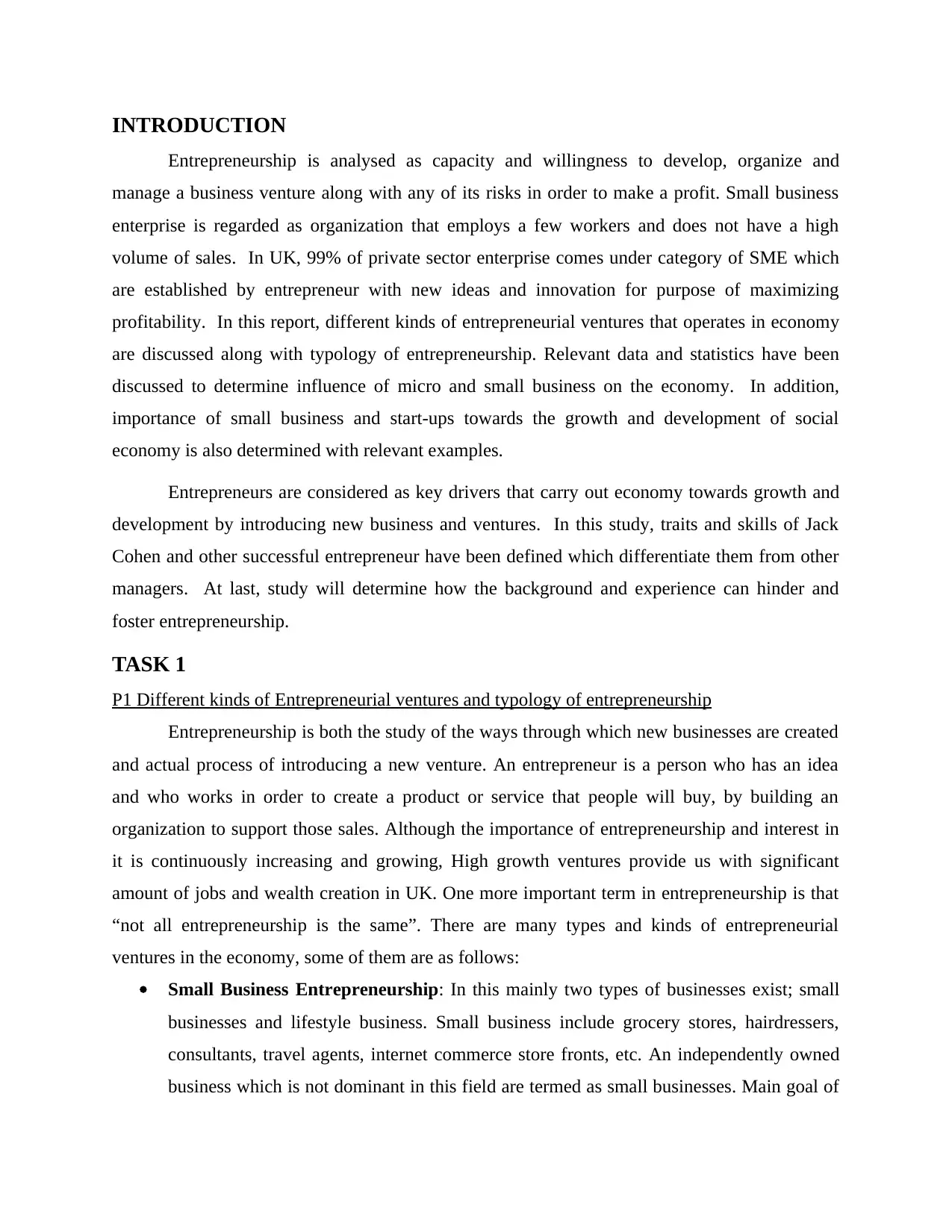
INTRODUCTION
Entrepreneurship is analysed as capacity and willingness to develop, organize and
manage a business venture along with any of its risks in order to make a profit. Small business
enterprise is regarded as organization that employs a few workers and does not have a high
volume of sales. In UK, 99% of private sector enterprise comes under category of SME which
are established by entrepreneur with new ideas and innovation for purpose of maximizing
profitability. In this report, different kinds of entrepreneurial ventures that operates in economy
are discussed along with typology of entrepreneurship. Relevant data and statistics have been
discussed to determine influence of micro and small business on the economy. In addition,
importance of small business and start-ups towards the growth and development of social
economy is also determined with relevant examples.
Entrepreneurs are considered as key drivers that carry out economy towards growth and
development by introducing new business and ventures. In this study, traits and skills of Jack
Cohen and other successful entrepreneur have been defined which differentiate them from other
managers. At last, study will determine how the background and experience can hinder and
foster entrepreneurship.
TASK 1
P1 Different kinds of Entrepreneurial ventures and typology of entrepreneurship
Entrepreneurship is both the study of the ways through which new businesses are created
and actual process of introducing a new venture. An entrepreneur is a person who has an idea
and who works in order to create a product or service that people will buy, by building an
organization to support those sales. Although the importance of entrepreneurship and interest in
it is continuously increasing and growing, High growth ventures provide us with significant
amount of jobs and wealth creation in UK. One more important term in entrepreneurship is that
“not all entrepreneurship is the same”. There are many types and kinds of entrepreneurial
ventures in the economy, some of them are as follows:
Small Business Entrepreneurship: In this mainly two types of businesses exist; small
businesses and lifestyle business. Small business include grocery stores, hairdressers,
consultants, travel agents, internet commerce store fronts, etc. An independently owned
business which is not dominant in this field are termed as small businesses. Main goal of
Entrepreneurship is analysed as capacity and willingness to develop, organize and
manage a business venture along with any of its risks in order to make a profit. Small business
enterprise is regarded as organization that employs a few workers and does not have a high
volume of sales. In UK, 99% of private sector enterprise comes under category of SME which
are established by entrepreneur with new ideas and innovation for purpose of maximizing
profitability. In this report, different kinds of entrepreneurial ventures that operates in economy
are discussed along with typology of entrepreneurship. Relevant data and statistics have been
discussed to determine influence of micro and small business on the economy. In addition,
importance of small business and start-ups towards the growth and development of social
economy is also determined with relevant examples.
Entrepreneurs are considered as key drivers that carry out economy towards growth and
development by introducing new business and ventures. In this study, traits and skills of Jack
Cohen and other successful entrepreneur have been defined which differentiate them from other
managers. At last, study will determine how the background and experience can hinder and
foster entrepreneurship.
TASK 1
P1 Different kinds of Entrepreneurial ventures and typology of entrepreneurship
Entrepreneurship is both the study of the ways through which new businesses are created
and actual process of introducing a new venture. An entrepreneur is a person who has an idea
and who works in order to create a product or service that people will buy, by building an
organization to support those sales. Although the importance of entrepreneurship and interest in
it is continuously increasing and growing, High growth ventures provide us with significant
amount of jobs and wealth creation in UK. One more important term in entrepreneurship is that
“not all entrepreneurship is the same”. There are many types and kinds of entrepreneurial
ventures in the economy, some of them are as follows:
Small Business Entrepreneurship: In this mainly two types of businesses exist; small
businesses and lifestyle business. Small business include grocery stores, hairdressers,
consultants, travel agents, internet commerce store fronts, etc. An independently owned
business which is not dominant in this field are termed as small businesses. Main goal of
Secure Best Marks with AI Grader
Need help grading? Try our AI Grader for instant feedback on your assignments.
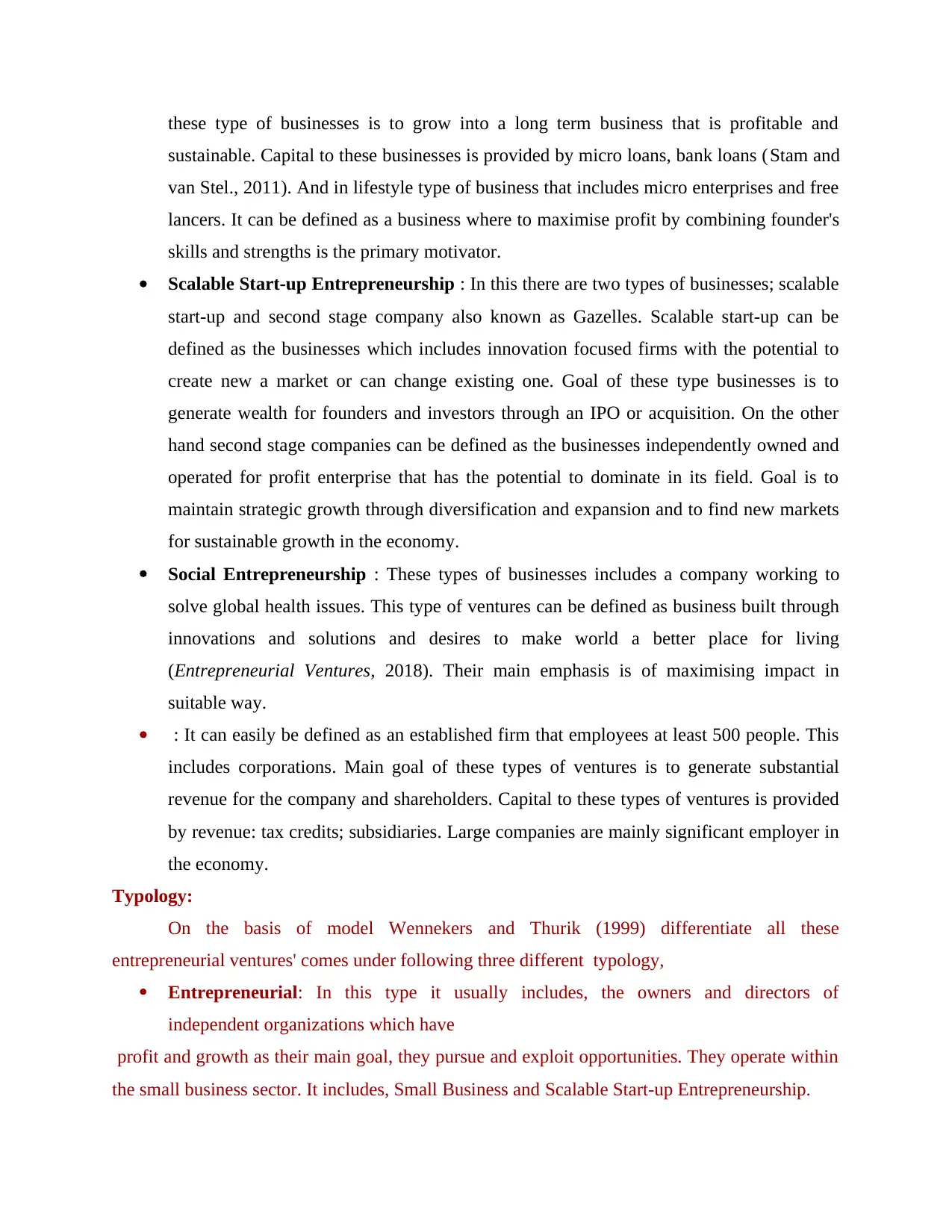
these type of businesses is to grow into a long term business that is profitable and
sustainable. Capital to these businesses is provided by micro loans, bank loans (Stam and
van Stel., 2011). And in lifestyle type of business that includes micro enterprises and free
lancers. It can be defined as a business where to maximise profit by combining founder's
skills and strengths is the primary motivator.
Scalable Start-up Entrepreneurship : In this there are two types of businesses; scalable
start-up and second stage company also known as Gazelles. Scalable start-up can be
defined as the businesses which includes innovation focused firms with the potential to
create new a market or can change existing one. Goal of these type businesses is to
generate wealth for founders and investors through an IPO or acquisition. On the other
hand second stage companies can be defined as the businesses independently owned and
operated for profit enterprise that has the potential to dominate in its field. Goal is to
maintain strategic growth through diversification and expansion and to find new markets
for sustainable growth in the economy.
Social Entrepreneurship : These types of businesses includes a company working to
solve global health issues. This type of ventures can be defined as business built through
innovations and solutions and desires to make world a better place for living
(Entrepreneurial Ventures, 2018). Their main emphasis is of maximising impact in
suitable way.
: It can easily be defined as an established firm that employees at least 500 people. This
includes corporations. Main goal of these types of ventures is to generate substantial
revenue for the company and shareholders. Capital to these types of ventures is provided
by revenue: tax credits; subsidiaries. Large companies are mainly significant employer in
the economy.
Typology:
On the basis of model Wennekers and Thurik (1999) differentiate all these
entrepreneurial ventures' comes under following three different typology,
Entrepreneurial: In this type it usually includes, the owners and directors of
independent organizations which have
profit and growth as their main goal, they pursue and exploit opportunities. They operate within
the small business sector. It includes, Small Business and Scalable Start-up Entrepreneurship.
sustainable. Capital to these businesses is provided by micro loans, bank loans (Stam and
van Stel., 2011). And in lifestyle type of business that includes micro enterprises and free
lancers. It can be defined as a business where to maximise profit by combining founder's
skills and strengths is the primary motivator.
Scalable Start-up Entrepreneurship : In this there are two types of businesses; scalable
start-up and second stage company also known as Gazelles. Scalable start-up can be
defined as the businesses which includes innovation focused firms with the potential to
create new a market or can change existing one. Goal of these type businesses is to
generate wealth for founders and investors through an IPO or acquisition. On the other
hand second stage companies can be defined as the businesses independently owned and
operated for profit enterprise that has the potential to dominate in its field. Goal is to
maintain strategic growth through diversification and expansion and to find new markets
for sustainable growth in the economy.
Social Entrepreneurship : These types of businesses includes a company working to
solve global health issues. This type of ventures can be defined as business built through
innovations and solutions and desires to make world a better place for living
(Entrepreneurial Ventures, 2018). Their main emphasis is of maximising impact in
suitable way.
: It can easily be defined as an established firm that employees at least 500 people. This
includes corporations. Main goal of these types of ventures is to generate substantial
revenue for the company and shareholders. Capital to these types of ventures is provided
by revenue: tax credits; subsidiaries. Large companies are mainly significant employer in
the economy.
Typology:
On the basis of model Wennekers and Thurik (1999) differentiate all these
entrepreneurial ventures' comes under following three different typology,
Entrepreneurial: In this type it usually includes, the owners and directors of
independent organizations which have
profit and growth as their main goal, they pursue and exploit opportunities. They operate within
the small business sector. It includes, Small Business and Scalable Start-up Entrepreneurship.
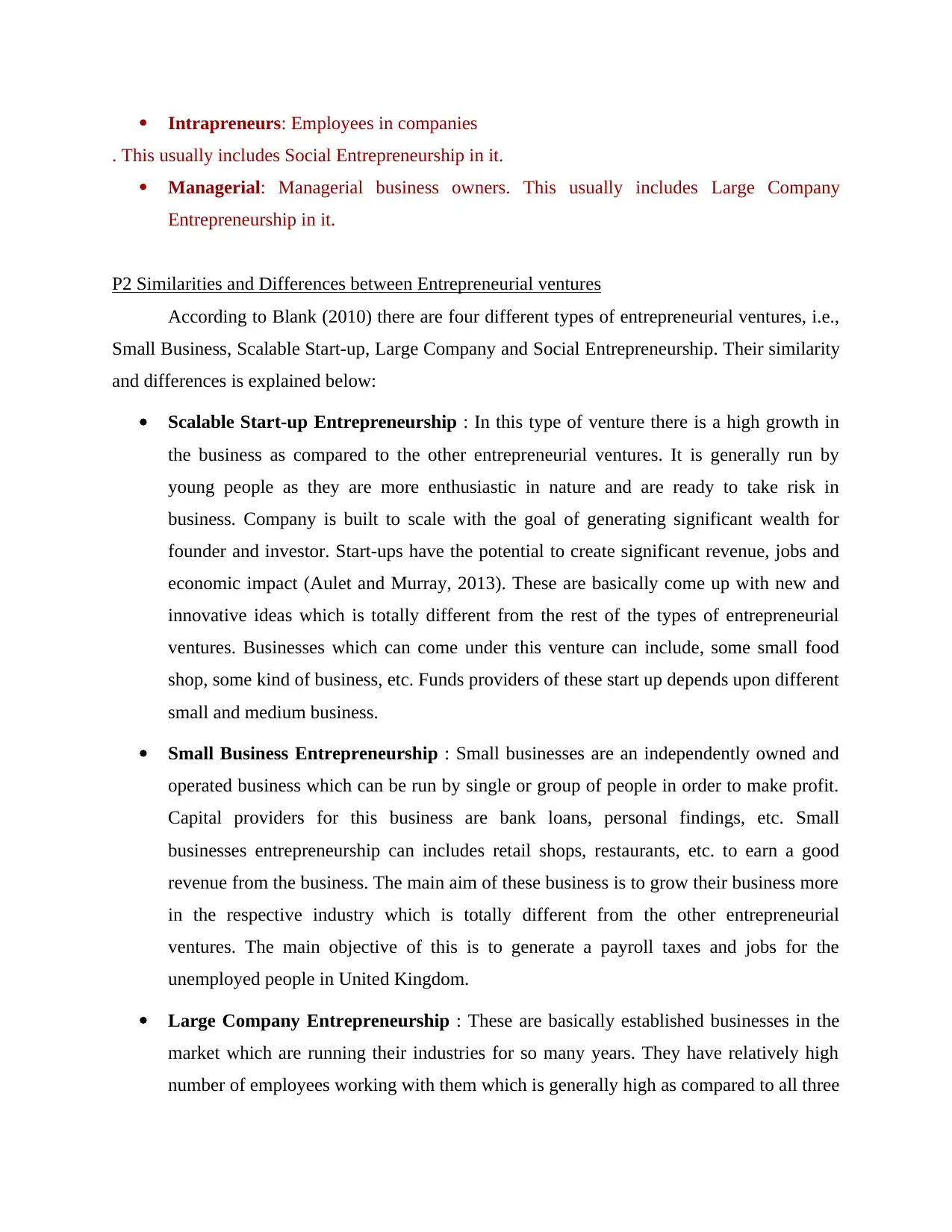
Intrapreneurs: Employees in companies
. This usually includes Social Entrepreneurship in it.
Managerial: Managerial business owners. This usually includes Large Company
Entrepreneurship in it.
P2 Similarities and Differences between Entrepreneurial ventures
According to Blank (2010) there are four different types of entrepreneurial ventures, i.e.,
Small Business, Scalable Start-up, Large Company and Social Entrepreneurship. Their similarity
and differences is explained below:
Scalable Start-up Entrepreneurship : In this type of venture there is a high growth in
the business as compared to the other entrepreneurial ventures. It is generally run by
young people as they are more enthusiastic in nature and are ready to take risk in
business. Company is built to scale with the goal of generating significant wealth for
founder and investor. Start-ups have the potential to create significant revenue, jobs and
economic impact (Aulet and Murray, 2013). These are basically come up with new and
innovative ideas which is totally different from the rest of the types of entrepreneurial
ventures. Businesses which can come under this venture can include, some small food
shop, some kind of business, etc. Funds providers of these start up depends upon different
small and medium business.
Small Business Entrepreneurship : Small businesses are an independently owned and
operated business which can be run by single or group of people in order to make profit.
Capital providers for this business are bank loans, personal findings, etc. Small
businesses entrepreneurship can includes retail shops, restaurants, etc. to earn a good
revenue from the business. The main aim of these business is to grow their business more
in the respective industry which is totally different from the other entrepreneurial
ventures. The main objective of this is to generate a payroll taxes and jobs for the
unemployed people in United Kingdom.
Large Company Entrepreneurship : These are basically established businesses in the
market which are running their industries for so many years. They have relatively high
number of employees working with them which is generally high as compared to all three
. This usually includes Social Entrepreneurship in it.
Managerial: Managerial business owners. This usually includes Large Company
Entrepreneurship in it.
P2 Similarities and Differences between Entrepreneurial ventures
According to Blank (2010) there are four different types of entrepreneurial ventures, i.e.,
Small Business, Scalable Start-up, Large Company and Social Entrepreneurship. Their similarity
and differences is explained below:
Scalable Start-up Entrepreneurship : In this type of venture there is a high growth in
the business as compared to the other entrepreneurial ventures. It is generally run by
young people as they are more enthusiastic in nature and are ready to take risk in
business. Company is built to scale with the goal of generating significant wealth for
founder and investor. Start-ups have the potential to create significant revenue, jobs and
economic impact (Aulet and Murray, 2013). These are basically come up with new and
innovative ideas which is totally different from the rest of the types of entrepreneurial
ventures. Businesses which can come under this venture can include, some small food
shop, some kind of business, etc. Funds providers of these start up depends upon different
small and medium business.
Small Business Entrepreneurship : Small businesses are an independently owned and
operated business which can be run by single or group of people in order to make profit.
Capital providers for this business are bank loans, personal findings, etc. Small
businesses entrepreneurship can includes retail shops, restaurants, etc. to earn a good
revenue from the business. The main aim of these business is to grow their business more
in the respective industry which is totally different from the other entrepreneurial
ventures. The main objective of this is to generate a payroll taxes and jobs for the
unemployed people in United Kingdom.
Large Company Entrepreneurship : These are basically established businesses in the
market which are running their industries for so many years. They have relatively high
number of employees working with them which is generally high as compared to all three
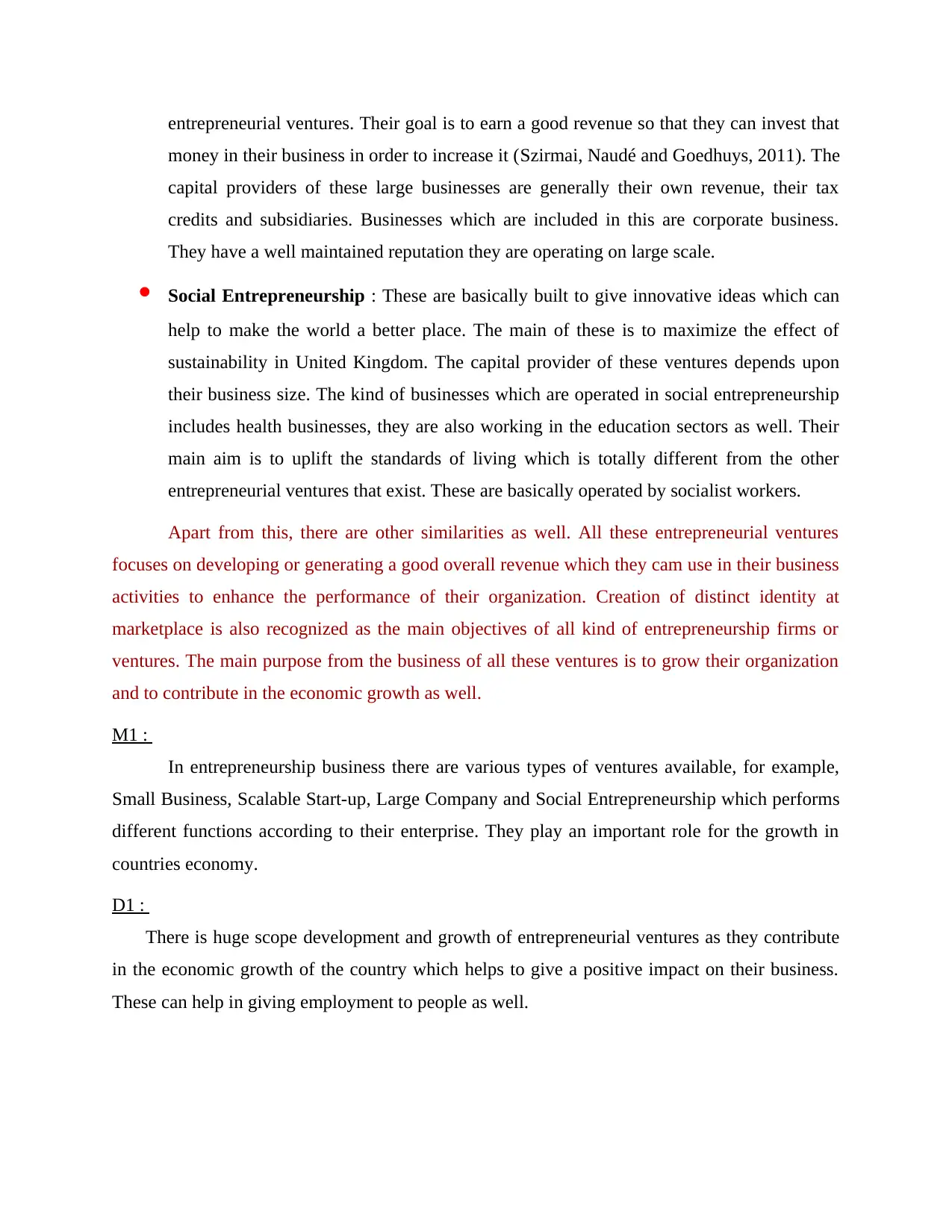
entrepreneurial ventures. Their goal is to earn a good revenue so that they can invest that
money in their business in order to increase it (Szirmai, Naudé and Goedhuys, 2011). The
capital providers of these large businesses are generally their own revenue, their tax
credits and subsidiaries. Businesses which are included in this are corporate business.
They have a well maintained reputation they are operating on large scale.
Social Entrepreneurship : These are basically built to give innovative ideas which can
help to make the world a better place. The main of these is to maximize the effect of
sustainability in United Kingdom. The capital provider of these ventures depends upon
their business size. The kind of businesses which are operated in social entrepreneurship
includes health businesses, they are also working in the education sectors as well. Their
main aim is to uplift the standards of living which is totally different from the other
entrepreneurial ventures that exist. These are basically operated by socialist workers.
Apart from this, there are other similarities as well. All these entrepreneurial ventures
focuses on developing or generating a good overall revenue which they cam use in their business
activities to enhance the performance of their organization. Creation of distinct identity at
marketplace is also recognized as the main objectives of all kind of entrepreneurship firms or
ventures. The main purpose from the business of all these ventures is to grow their organization
and to contribute in the economic growth as well.
M1 :
In entrepreneurship business there are various types of ventures available, for example,
Small Business, Scalable Start-up, Large Company and Social Entrepreneurship which performs
different functions according to their enterprise. They play an important role for the growth in
countries economy.
D1 :
There is huge scope development and growth of entrepreneurial ventures as they contribute
in the economic growth of the country which helps to give a positive impact on their business.
These can help in giving employment to people as well.
money in their business in order to increase it (Szirmai, Naudé and Goedhuys, 2011). The
capital providers of these large businesses are generally their own revenue, their tax
credits and subsidiaries. Businesses which are included in this are corporate business.
They have a well maintained reputation they are operating on large scale.
Social Entrepreneurship : These are basically built to give innovative ideas which can
help to make the world a better place. The main of these is to maximize the effect of
sustainability in United Kingdom. The capital provider of these ventures depends upon
their business size. The kind of businesses which are operated in social entrepreneurship
includes health businesses, they are also working in the education sectors as well. Their
main aim is to uplift the standards of living which is totally different from the other
entrepreneurial ventures that exist. These are basically operated by socialist workers.
Apart from this, there are other similarities as well. All these entrepreneurial ventures
focuses on developing or generating a good overall revenue which they cam use in their business
activities to enhance the performance of their organization. Creation of distinct identity at
marketplace is also recognized as the main objectives of all kind of entrepreneurship firms or
ventures. The main purpose from the business of all these ventures is to grow their organization
and to contribute in the economic growth as well.
M1 :
In entrepreneurship business there are various types of ventures available, for example,
Small Business, Scalable Start-up, Large Company and Social Entrepreneurship which performs
different functions according to their enterprise. They play an important role for the growth in
countries economy.
D1 :
There is huge scope development and growth of entrepreneurial ventures as they contribute
in the economic growth of the country which helps to give a positive impact on their business.
These can help in giving employment to people as well.
Paraphrase This Document
Need a fresh take? Get an instant paraphrase of this document with our AI Paraphraser
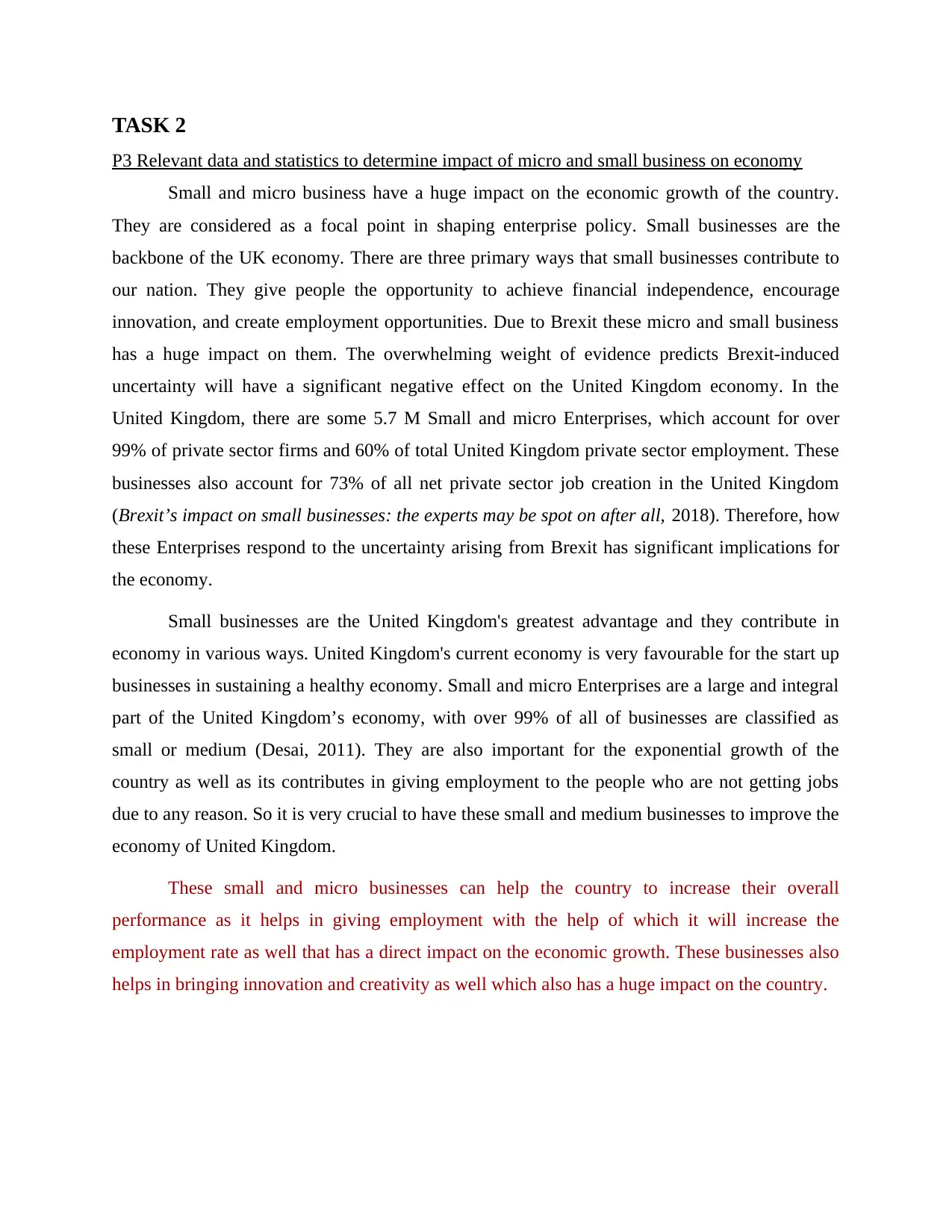
TASK 2
P3 Relevant data and statistics to determine impact of micro and small business on economy
Small and micro business have a huge impact on the economic growth of the country.
They are considered as a focal point in shaping enterprise policy. Small businesses are the
backbone of the UK economy. There are three primary ways that small businesses contribute to
our nation. They give people the opportunity to achieve financial independence, encourage
innovation, and create employment opportunities. Due to Brexit these micro and small business
has a huge impact on them. The overwhelming weight of evidence predicts Brexit-induced
uncertainty will have a significant negative effect on the United Kingdom economy. In the
United Kingdom, there are some 5.7 M Small and micro Enterprises, which account for over
99% of private sector firms and 60% of total United Kingdom private sector employment. These
businesses also account for 73% of all net private sector job creation in the United Kingdom
(Brexit’s impact on small businesses: the experts may be spot on after all, 2018). Therefore, how
these Enterprises respond to the uncertainty arising from Brexit has significant implications for
the economy.
Small businesses are the United Kingdom's greatest advantage and they contribute in
economy in various ways. United Kingdom's current economy is very favourable for the start up
businesses in sustaining a healthy economy. Small and micro Enterprises are a large and integral
part of the United Kingdom’s economy, with over 99% of all of businesses are classified as
small or medium (Desai, 2011). They are also important for the exponential growth of the
country as well as its contributes in giving employment to the people who are not getting jobs
due to any reason. So it is very crucial to have these small and medium businesses to improve the
economy of United Kingdom.
These small and micro businesses can help the country to increase their overall
performance as it helps in giving employment with the help of which it will increase the
employment rate as well that has a direct impact on the economic growth. These businesses also
helps in bringing innovation and creativity as well which also has a huge impact on the country.
P3 Relevant data and statistics to determine impact of micro and small business on economy
Small and micro business have a huge impact on the economic growth of the country.
They are considered as a focal point in shaping enterprise policy. Small businesses are the
backbone of the UK economy. There are three primary ways that small businesses contribute to
our nation. They give people the opportunity to achieve financial independence, encourage
innovation, and create employment opportunities. Due to Brexit these micro and small business
has a huge impact on them. The overwhelming weight of evidence predicts Brexit-induced
uncertainty will have a significant negative effect on the United Kingdom economy. In the
United Kingdom, there are some 5.7 M Small and micro Enterprises, which account for over
99% of private sector firms and 60% of total United Kingdom private sector employment. These
businesses also account for 73% of all net private sector job creation in the United Kingdom
(Brexit’s impact on small businesses: the experts may be spot on after all, 2018). Therefore, how
these Enterprises respond to the uncertainty arising from Brexit has significant implications for
the economy.
Small businesses are the United Kingdom's greatest advantage and they contribute in
economy in various ways. United Kingdom's current economy is very favourable for the start up
businesses in sustaining a healthy economy. Small and micro Enterprises are a large and integral
part of the United Kingdom’s economy, with over 99% of all of businesses are classified as
small or medium (Desai, 2011). They are also important for the exponential growth of the
country as well as its contributes in giving employment to the people who are not getting jobs
due to any reason. So it is very crucial to have these small and medium businesses to improve the
economy of United Kingdom.
These small and micro businesses can help the country to increase their overall
performance as it helps in giving employment with the help of which it will increase the
employment rate as well that has a direct impact on the economic growth. These businesses also
helps in bringing innovation and creativity as well which also has a huge impact on the country.
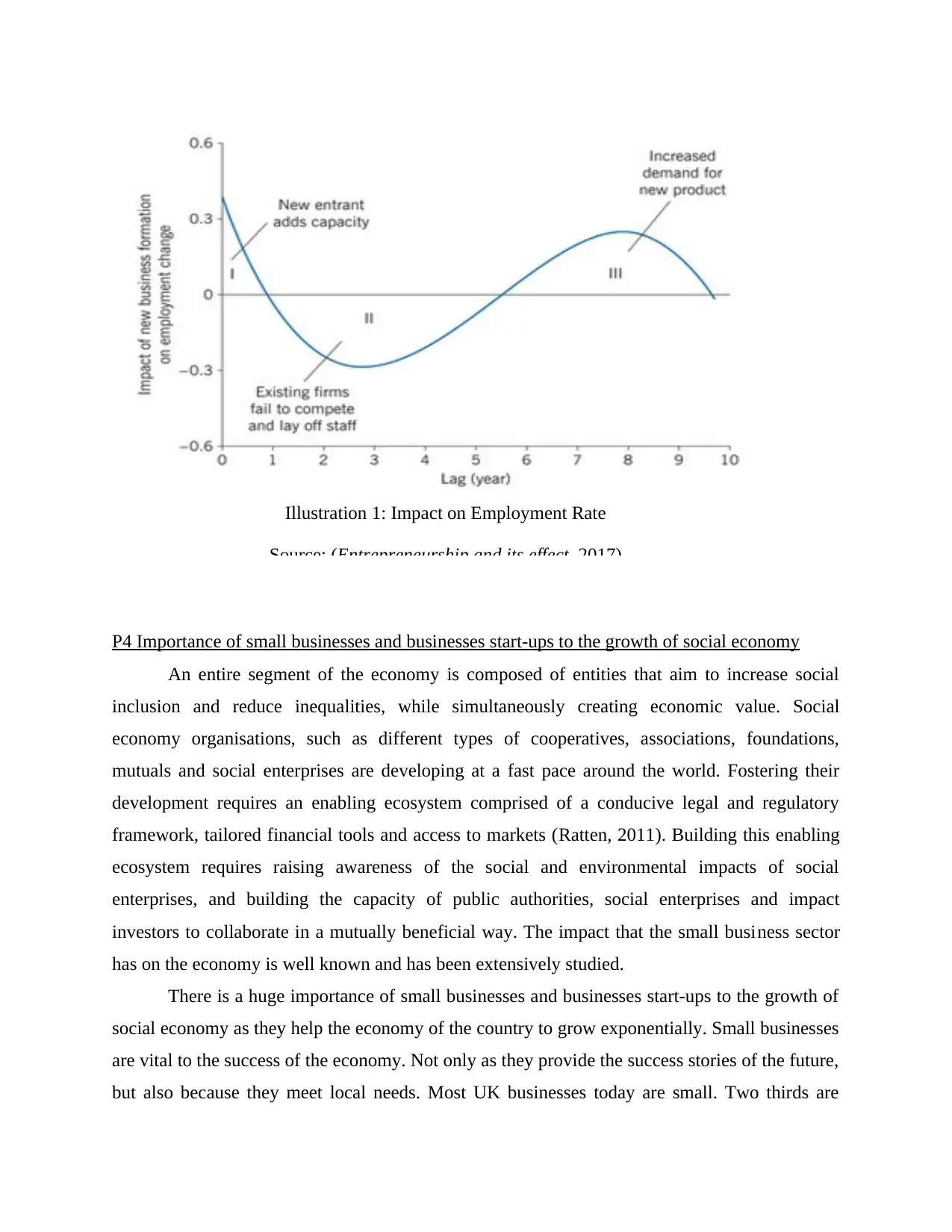
P4 Importance of small businesses and businesses start-ups to the growth of social economy
An entire segment of the economy is composed of entities that aim to increase social
inclusion and reduce inequalities, while simultaneously creating economic value. Social
economy organisations, such as different types of cooperatives, associations, foundations,
mutuals and social enterprises are developing at a fast pace around the world. Fostering their
development requires an enabling ecosystem comprised of a conducive legal and regulatory
framework, tailored financial tools and access to markets (Ratten, 2011). Building this enabling
ecosystem requires raising awareness of the social and environmental impacts of social
enterprises, and building the capacity of public authorities, social enterprises and impact
investors to collaborate in a mutually beneficial way. The impact that the small business sector
has on the economy is well known and has been extensively studied.
There is a huge importance of small businesses and businesses start-ups to the growth of
social economy as they help the economy of the country to grow exponentially. Small businesses
are vital to the success of the economy. Not only as they provide the success stories of the future,
but also because they meet local needs. Most UK businesses today are small. Two thirds are
Illustration 1: Impact on Employment Rate
Source: (Entrepreneurship and its effect, 2017)
An entire segment of the economy is composed of entities that aim to increase social
inclusion and reduce inequalities, while simultaneously creating economic value. Social
economy organisations, such as different types of cooperatives, associations, foundations,
mutuals and social enterprises are developing at a fast pace around the world. Fostering their
development requires an enabling ecosystem comprised of a conducive legal and regulatory
framework, tailored financial tools and access to markets (Ratten, 2011). Building this enabling
ecosystem requires raising awareness of the social and environmental impacts of social
enterprises, and building the capacity of public authorities, social enterprises and impact
investors to collaborate in a mutually beneficial way. The impact that the small business sector
has on the economy is well known and has been extensively studied.
There is a huge importance of small businesses and businesses start-ups to the growth of
social economy as they help the economy of the country to grow exponentially. Small businesses
are vital to the success of the economy. Not only as they provide the success stories of the future,
but also because they meet local needs. Most UK businesses today are small. Two thirds are
Illustration 1: Impact on Employment Rate
Source: (Entrepreneurship and its effect, 2017)
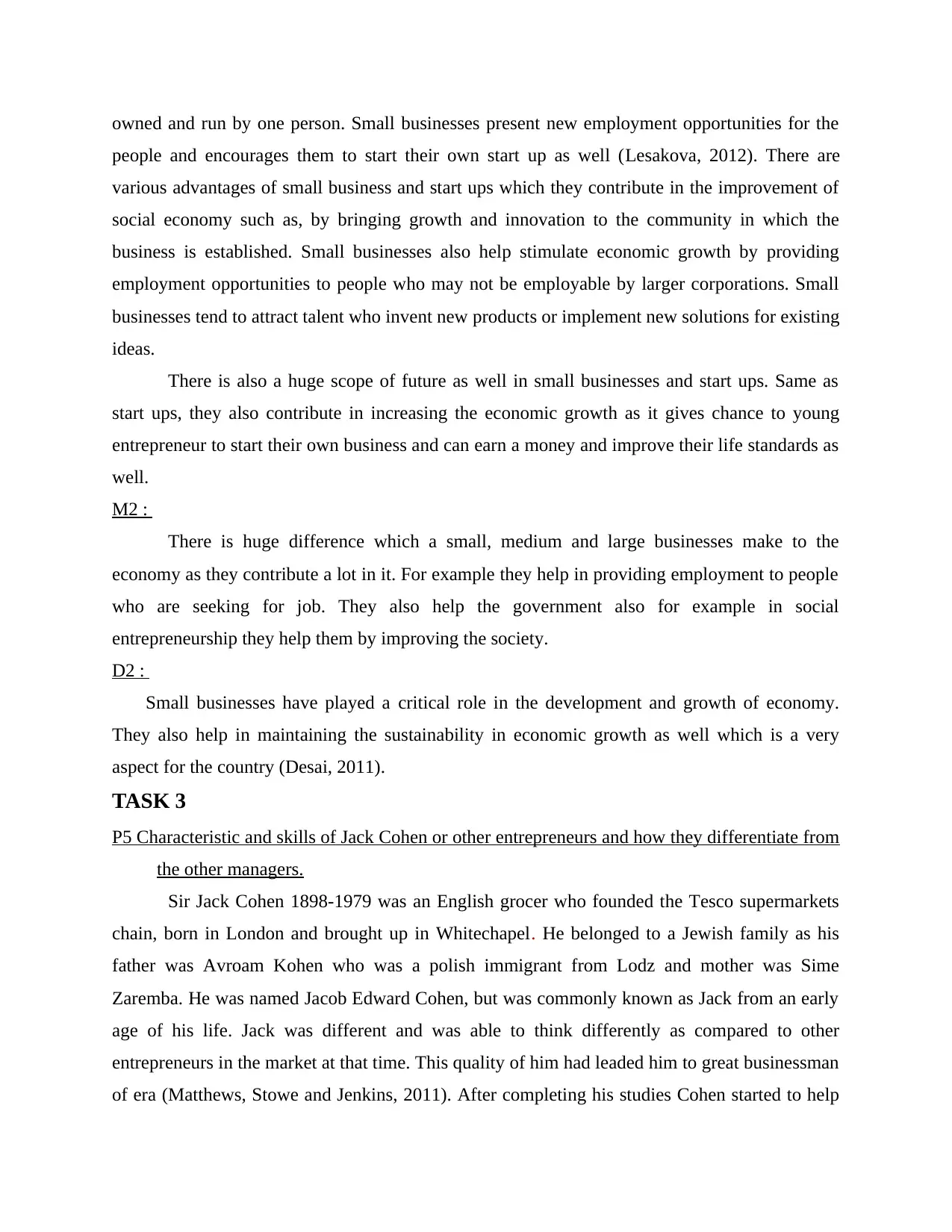
owned and run by one person. Small businesses present new employment opportunities for the
people and encourages them to start their own start up as well (Lesakova, 2012). There are
various advantages of small business and start ups which they contribute in the improvement of
social economy such as, by bringing growth and innovation to the community in which the
business is established. Small businesses also help stimulate economic growth by providing
employment opportunities to people who may not be employable by larger corporations. Small
businesses tend to attract talent who invent new products or implement new solutions for existing
ideas.
There is also a huge scope of future as well in small businesses and start ups. Same as
start ups, they also contribute in increasing the economic growth as it gives chance to young
entrepreneur to start their own business and can earn a money and improve their life standards as
well.
M2 :
There is huge difference which a small, medium and large businesses make to the
economy as they contribute a lot in it. For example they help in providing employment to people
who are seeking for job. They also help the government also for example in social
entrepreneurship they help them by improving the society.
D2 :
Small businesses have played a critical role in the development and growth of economy.
They also help in maintaining the sustainability in economic growth as well which is a very
aspect for the country (Desai, 2011).
TASK 3
P5 Characteristic and skills of Jack Cohen or other entrepreneurs and how they differentiate from
the other managers.
Sir Jack Cohen 1898-1979 was an English grocer who founded the Tesco supermarkets
chain, born in London and brought up in Whitechapel. He belonged to a Jewish family as his
father was Avroam Kohen who was a polish immigrant from Lodz and mother was Sime
Zaremba. He was named Jacob Edward Cohen, but was commonly known as Jack from an early
age of his life. Jack was different and was able to think differently as compared to other
entrepreneurs in the market at that time. This quality of him had leaded him to great businessman
of era (Matthews, Stowe and Jenkins, 2011). After completing his studies Cohen started to help
people and encourages them to start their own start up as well (Lesakova, 2012). There are
various advantages of small business and start ups which they contribute in the improvement of
social economy such as, by bringing growth and innovation to the community in which the
business is established. Small businesses also help stimulate economic growth by providing
employment opportunities to people who may not be employable by larger corporations. Small
businesses tend to attract talent who invent new products or implement new solutions for existing
ideas.
There is also a huge scope of future as well in small businesses and start ups. Same as
start ups, they also contribute in increasing the economic growth as it gives chance to young
entrepreneur to start their own business and can earn a money and improve their life standards as
well.
M2 :
There is huge difference which a small, medium and large businesses make to the
economy as they contribute a lot in it. For example they help in providing employment to people
who are seeking for job. They also help the government also for example in social
entrepreneurship they help them by improving the society.
D2 :
Small businesses have played a critical role in the development and growth of economy.
They also help in maintaining the sustainability in economic growth as well which is a very
aspect for the country (Desai, 2011).
TASK 3
P5 Characteristic and skills of Jack Cohen or other entrepreneurs and how they differentiate from
the other managers.
Sir Jack Cohen 1898-1979 was an English grocer who founded the Tesco supermarkets
chain, born in London and brought up in Whitechapel. He belonged to a Jewish family as his
father was Avroam Kohen who was a polish immigrant from Lodz and mother was Sime
Zaremba. He was named Jacob Edward Cohen, but was commonly known as Jack from an early
age of his life. Jack was different and was able to think differently as compared to other
entrepreneurs in the market at that time. This quality of him had leaded him to great businessman
of era (Matthews, Stowe and Jenkins, 2011). After completing his studies Cohen started to help
Secure Best Marks with AI Grader
Need help grading? Try our AI Grader for instant feedback on your assignments.
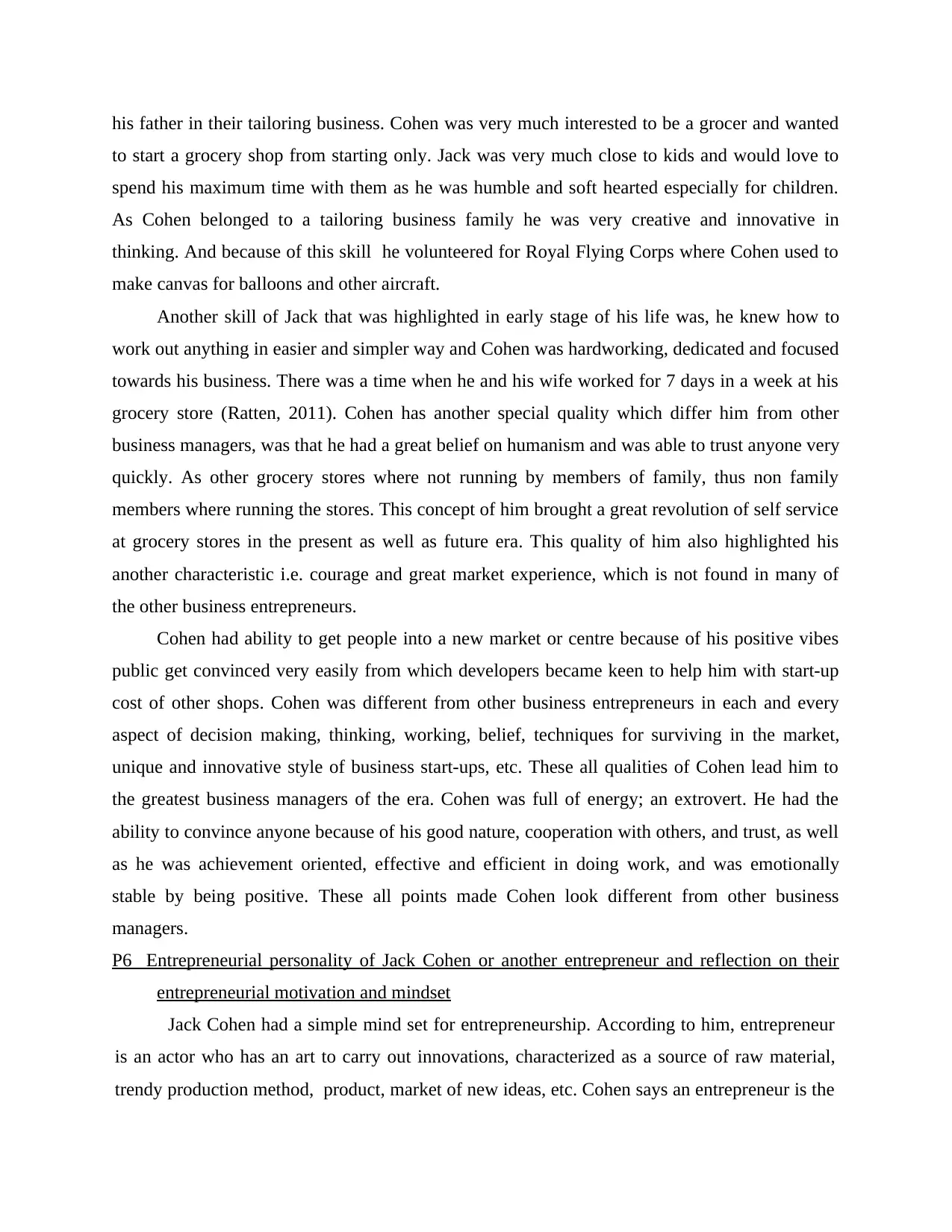
his father in their tailoring business. Cohen was very much interested to be a grocer and wanted
to start a grocery shop from starting only. Jack was very much close to kids and would love to
spend his maximum time with them as he was humble and soft hearted especially for children.
As Cohen belonged to a tailoring business family he was very creative and innovative in
thinking. And because of this skill he volunteered for Royal Flying Corps where Cohen used to
make canvas for balloons and other aircraft.
Another skill of Jack that was highlighted in early stage of his life was, he knew how to
work out anything in easier and simpler way and Cohen was hardworking, dedicated and focused
towards his business. There was a time when he and his wife worked for 7 days in a week at his
grocery store (Ratten, 2011). Cohen has another special quality which differ him from other
business managers, was that he had a great belief on humanism and was able to trust anyone very
quickly. As other grocery stores where not running by members of family, thus non family
members where running the stores. This concept of him brought a great revolution of self service
at grocery stores in the present as well as future era. This quality of him also highlighted his
another characteristic i.e. courage and great market experience, which is not found in many of
the other business entrepreneurs.
Cohen had ability to get people into a new market or centre because of his positive vibes
public get convinced very easily from which developers became keen to help him with start-up
cost of other shops. Cohen was different from other business entrepreneurs in each and every
aspect of decision making, thinking, working, belief, techniques for surviving in the market,
unique and innovative style of business start-ups, etc. These all qualities of Cohen lead him to
the greatest business managers of the era. Cohen was full of energy; an extrovert. He had the
ability to convince anyone because of his good nature, cooperation with others, and trust, as well
as he was achievement oriented, effective and efficient in doing work, and was emotionally
stable by being positive. These all points made Cohen look different from other business
managers.
P6 Entrepreneurial personality of Jack Cohen or another entrepreneur and reflection on their
entrepreneurial motivation and mindset
Jack Cohen had a simple mind set for entrepreneurship. According to him, entrepreneur
is an actor who has an art to carry out innovations, characterized as a source of raw material,
trendy production method, product, market of new ideas, etc. Cohen says an entrepreneur is the
to start a grocery shop from starting only. Jack was very much close to kids and would love to
spend his maximum time with them as he was humble and soft hearted especially for children.
As Cohen belonged to a tailoring business family he was very creative and innovative in
thinking. And because of this skill he volunteered for Royal Flying Corps where Cohen used to
make canvas for balloons and other aircraft.
Another skill of Jack that was highlighted in early stage of his life was, he knew how to
work out anything in easier and simpler way and Cohen was hardworking, dedicated and focused
towards his business. There was a time when he and his wife worked for 7 days in a week at his
grocery store (Ratten, 2011). Cohen has another special quality which differ him from other
business managers, was that he had a great belief on humanism and was able to trust anyone very
quickly. As other grocery stores where not running by members of family, thus non family
members where running the stores. This concept of him brought a great revolution of self service
at grocery stores in the present as well as future era. This quality of him also highlighted his
another characteristic i.e. courage and great market experience, which is not found in many of
the other business entrepreneurs.
Cohen had ability to get people into a new market or centre because of his positive vibes
public get convinced very easily from which developers became keen to help him with start-up
cost of other shops. Cohen was different from other business entrepreneurs in each and every
aspect of decision making, thinking, working, belief, techniques for surviving in the market,
unique and innovative style of business start-ups, etc. These all qualities of Cohen lead him to
the greatest business managers of the era. Cohen was full of energy; an extrovert. He had the
ability to convince anyone because of his good nature, cooperation with others, and trust, as well
as he was achievement oriented, effective and efficient in doing work, and was emotionally
stable by being positive. These all points made Cohen look different from other business
managers.
P6 Entrepreneurial personality of Jack Cohen or another entrepreneur and reflection on their
entrepreneurial motivation and mindset
Jack Cohen had a simple mind set for entrepreneurship. According to him, entrepreneur
is an actor who has an art to carry out innovations, characterized as a source of raw material,
trendy production method, product, market of new ideas, etc. Cohen says an entrepreneur is the
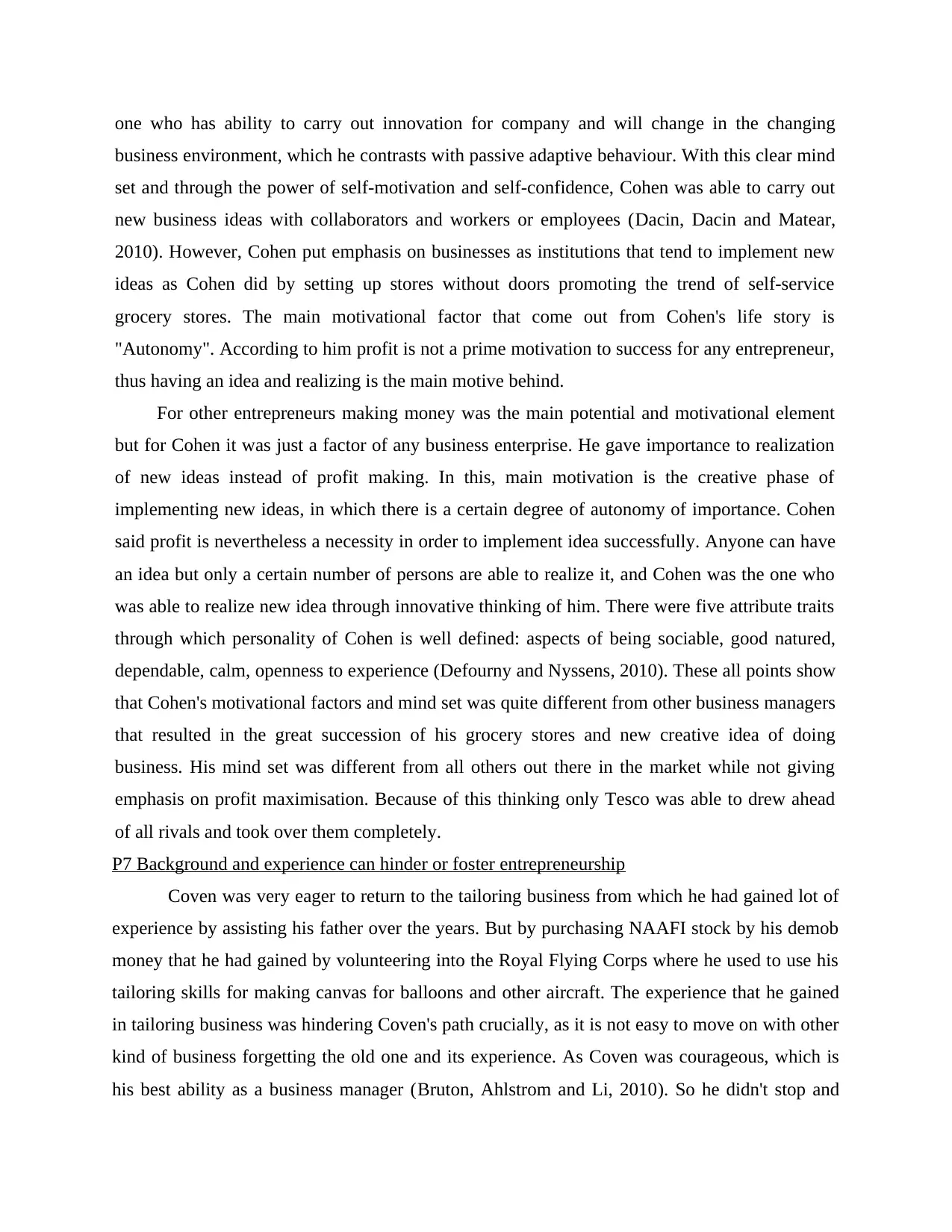
one who has ability to carry out innovation for company and will change in the changing
business environment, which he contrasts with passive adaptive behaviour. With this clear mind
set and through the power of self-motivation and self-confidence, Cohen was able to carry out
new business ideas with collaborators and workers or employees (Dacin, Dacin and Matear,
2010). However, Cohen put emphasis on businesses as institutions that tend to implement new
ideas as Cohen did by setting up stores without doors promoting the trend of self-service
grocery stores. The main motivational factor that come out from Cohen's life story is
"Autonomy". According to him profit is not a prime motivation to success for any entrepreneur,
thus having an idea and realizing is the main motive behind.
For other entrepreneurs making money was the main potential and motivational element
but for Cohen it was just a factor of any business enterprise. He gave importance to realization
of new ideas instead of profit making. In this, main motivation is the creative phase of
implementing new ideas, in which there is a certain degree of autonomy of importance. Cohen
said profit is nevertheless a necessity in order to implement idea successfully. Anyone can have
an idea but only a certain number of persons are able to realize it, and Cohen was the one who
was able to realize new idea through innovative thinking of him. There were five attribute traits
through which personality of Cohen is well defined: aspects of being sociable, good natured,
dependable, calm, openness to experience (Defourny and Nyssens, 2010). These all points show
that Cohen's motivational factors and mind set was quite different from other business managers
that resulted in the great succession of his grocery stores and new creative idea of doing
business. His mind set was different from all others out there in the market while not giving
emphasis on profit maximisation. Because of this thinking only Tesco was able to drew ahead
of all rivals and took over them completely.
P7 Background and experience can hinder or foster entrepreneurship
Coven was very eager to return to the tailoring business from which he had gained lot of
experience by assisting his father over the years. But by purchasing NAAFI stock by his demob
money that he had gained by volunteering into the Royal Flying Corps where he used to use his
tailoring skills for making canvas for balloons and other aircraft. The experience that he gained
in tailoring business was hindering Coven's path crucially, as it is not easy to move on with other
kind of business forgetting the old one and its experience. As Coven was courageous, which is
his best ability as a business manager (Bruton, Ahlstrom and Li, 2010). So he didn't stop and
business environment, which he contrasts with passive adaptive behaviour. With this clear mind
set and through the power of self-motivation and self-confidence, Cohen was able to carry out
new business ideas with collaborators and workers or employees (Dacin, Dacin and Matear,
2010). However, Cohen put emphasis on businesses as institutions that tend to implement new
ideas as Cohen did by setting up stores without doors promoting the trend of self-service
grocery stores. The main motivational factor that come out from Cohen's life story is
"Autonomy". According to him profit is not a prime motivation to success for any entrepreneur,
thus having an idea and realizing is the main motive behind.
For other entrepreneurs making money was the main potential and motivational element
but for Cohen it was just a factor of any business enterprise. He gave importance to realization
of new ideas instead of profit making. In this, main motivation is the creative phase of
implementing new ideas, in which there is a certain degree of autonomy of importance. Cohen
said profit is nevertheless a necessity in order to implement idea successfully. Anyone can have
an idea but only a certain number of persons are able to realize it, and Cohen was the one who
was able to realize new idea through innovative thinking of him. There were five attribute traits
through which personality of Cohen is well defined: aspects of being sociable, good natured,
dependable, calm, openness to experience (Defourny and Nyssens, 2010). These all points show
that Cohen's motivational factors and mind set was quite different from other business managers
that resulted in the great succession of his grocery stores and new creative idea of doing
business. His mind set was different from all others out there in the market while not giving
emphasis on profit maximisation. Because of this thinking only Tesco was able to drew ahead
of all rivals and took over them completely.
P7 Background and experience can hinder or foster entrepreneurship
Coven was very eager to return to the tailoring business from which he had gained lot of
experience by assisting his father over the years. But by purchasing NAAFI stock by his demob
money that he had gained by volunteering into the Royal Flying Corps where he used to use his
tailoring skills for making canvas for balloons and other aircraft. The experience that he gained
in tailoring business was hindering Coven's path crucially, as it is not easy to move on with other
kind of business forgetting the old one and its experience. As Coven was courageous, which is
his best ability as a business manager (Bruton, Ahlstrom and Li, 2010). So he didn't stop and
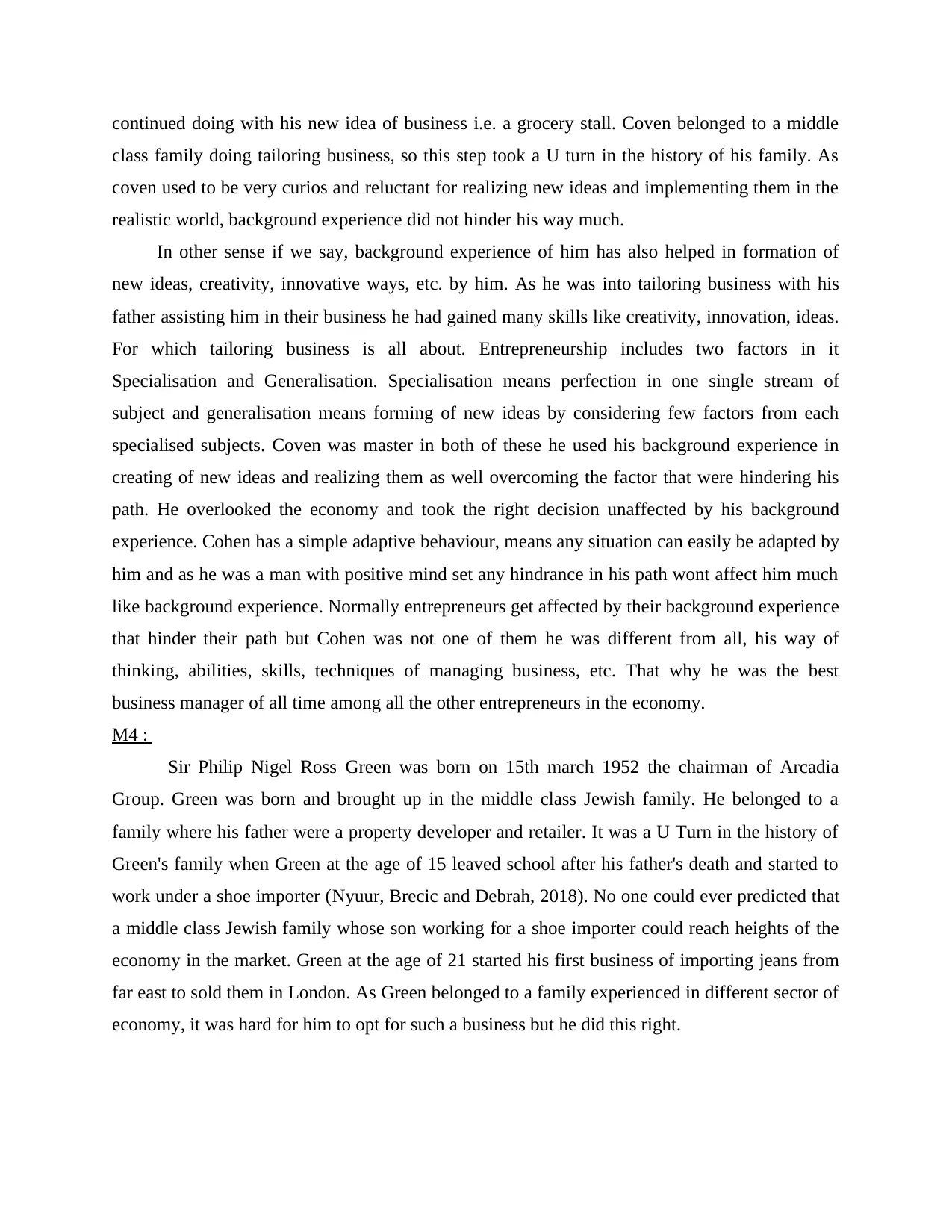
continued doing with his new idea of business i.e. a grocery stall. Coven belonged to a middle
class family doing tailoring business, so this step took a U turn in the history of his family. As
coven used to be very curios and reluctant for realizing new ideas and implementing them in the
realistic world, background experience did not hinder his way much.
In other sense if we say, background experience of him has also helped in formation of
new ideas, creativity, innovative ways, etc. by him. As he was into tailoring business with his
father assisting him in their business he had gained many skills like creativity, innovation, ideas.
For which tailoring business is all about. Entrepreneurship includes two factors in it
Specialisation and Generalisation. Specialisation means perfection in one single stream of
subject and generalisation means forming of new ideas by considering few factors from each
specialised subjects. Coven was master in both of these he used his background experience in
creating of new ideas and realizing them as well overcoming the factor that were hindering his
path. He overlooked the economy and took the right decision unaffected by his background
experience. Cohen has a simple adaptive behaviour, means any situation can easily be adapted by
him and as he was a man with positive mind set any hindrance in his path wont affect him much
like background experience. Normally entrepreneurs get affected by their background experience
that hinder their path but Cohen was not one of them he was different from all, his way of
thinking, abilities, skills, techniques of managing business, etc. That why he was the best
business manager of all time among all the other entrepreneurs in the economy.
M4 :
Sir Philip Nigel Ross Green was born on 15th march 1952 the chairman of Arcadia
Group. Green was born and brought up in the middle class Jewish family. He belonged to a
family where his father were a property developer and retailer. It was a U Turn in the history of
Green's family when Green at the age of 15 leaved school after his father's death and started to
work under a shoe importer (Nyuur, Brecic and Debrah, 2018). No one could ever predicted that
a middle class Jewish family whose son working for a shoe importer could reach heights of the
economy in the market. Green at the age of 21 started his first business of importing jeans from
far east to sold them in London. As Green belonged to a family experienced in different sector of
economy, it was hard for him to opt for such a business but he did this right.
class family doing tailoring business, so this step took a U turn in the history of his family. As
coven used to be very curios and reluctant for realizing new ideas and implementing them in the
realistic world, background experience did not hinder his way much.
In other sense if we say, background experience of him has also helped in formation of
new ideas, creativity, innovative ways, etc. by him. As he was into tailoring business with his
father assisting him in their business he had gained many skills like creativity, innovation, ideas.
For which tailoring business is all about. Entrepreneurship includes two factors in it
Specialisation and Generalisation. Specialisation means perfection in one single stream of
subject and generalisation means forming of new ideas by considering few factors from each
specialised subjects. Coven was master in both of these he used his background experience in
creating of new ideas and realizing them as well overcoming the factor that were hindering his
path. He overlooked the economy and took the right decision unaffected by his background
experience. Cohen has a simple adaptive behaviour, means any situation can easily be adapted by
him and as he was a man with positive mind set any hindrance in his path wont affect him much
like background experience. Normally entrepreneurs get affected by their background experience
that hinder their path but Cohen was not one of them he was different from all, his way of
thinking, abilities, skills, techniques of managing business, etc. That why he was the best
business manager of all time among all the other entrepreneurs in the economy.
M4 :
Sir Philip Nigel Ross Green was born on 15th march 1952 the chairman of Arcadia
Group. Green was born and brought up in the middle class Jewish family. He belonged to a
family where his father were a property developer and retailer. It was a U Turn in the history of
Green's family when Green at the age of 15 leaved school after his father's death and started to
work under a shoe importer (Nyuur, Brecic and Debrah, 2018). No one could ever predicted that
a middle class Jewish family whose son working for a shoe importer could reach heights of the
economy in the market. Green at the age of 21 started his first business of importing jeans from
far east to sold them in London. As Green belonged to a family experienced in different sector of
economy, it was hard for him to opt for such a business but he did this right.
Paraphrase This Document
Need a fresh take? Get an instant paraphrase of this document with our AI Paraphraser
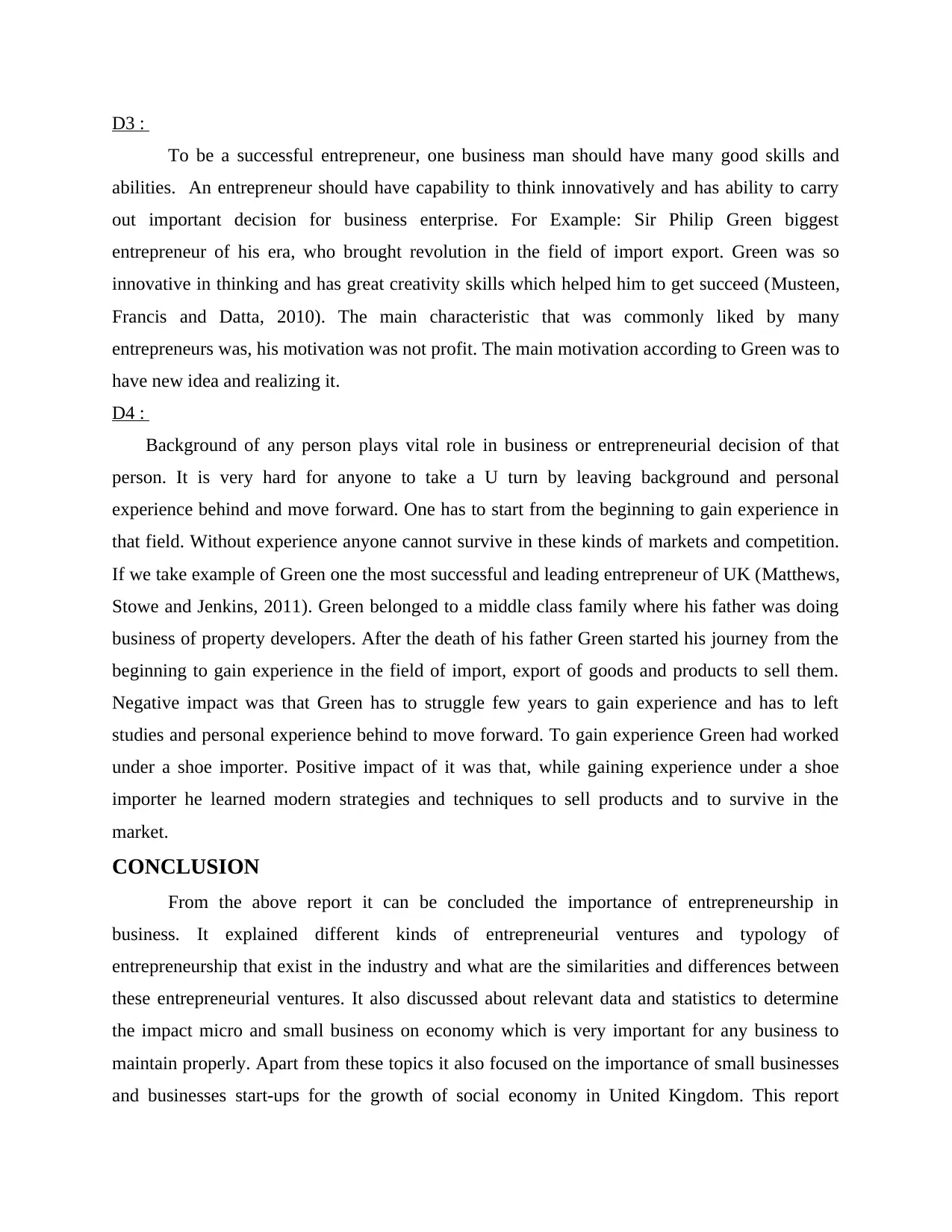
D3 :
To be a successful entrepreneur, one business man should have many good skills and
abilities. An entrepreneur should have capability to think innovatively and has ability to carry
out important decision for business enterprise. For Example: Sir Philip Green biggest
entrepreneur of his era, who brought revolution in the field of import export. Green was so
innovative in thinking and has great creativity skills which helped him to get succeed (Musteen,
Francis and Datta, 2010). The main characteristic that was commonly liked by many
entrepreneurs was, his motivation was not profit. The main motivation according to Green was to
have new idea and realizing it.
D4 :
Background of any person plays vital role in business or entrepreneurial decision of that
person. It is very hard for anyone to take a U turn by leaving background and personal
experience behind and move forward. One has to start from the beginning to gain experience in
that field. Without experience anyone cannot survive in these kinds of markets and competition.
If we take example of Green one the most successful and leading entrepreneur of UK (Matthews,
Stowe and Jenkins, 2011). Green belonged to a middle class family where his father was doing
business of property developers. After the death of his father Green started his journey from the
beginning to gain experience in the field of import, export of goods and products to sell them.
Negative impact was that Green has to struggle few years to gain experience and has to left
studies and personal experience behind to move forward. To gain experience Green had worked
under a shoe importer. Positive impact of it was that, while gaining experience under a shoe
importer he learned modern strategies and techniques to sell products and to survive in the
market.
CONCLUSION
From the above report it can be concluded the importance of entrepreneurship in
business. It explained different kinds of entrepreneurial ventures and typology of
entrepreneurship that exist in the industry and what are the similarities and differences between
these entrepreneurial ventures. It also discussed about relevant data and statistics to determine
the impact micro and small business on economy which is very important for any business to
maintain properly. Apart from these topics it also focused on the importance of small businesses
and businesses start-ups for the growth of social economy in United Kingdom. This report
To be a successful entrepreneur, one business man should have many good skills and
abilities. An entrepreneur should have capability to think innovatively and has ability to carry
out important decision for business enterprise. For Example: Sir Philip Green biggest
entrepreneur of his era, who brought revolution in the field of import export. Green was so
innovative in thinking and has great creativity skills which helped him to get succeed (Musteen,
Francis and Datta, 2010). The main characteristic that was commonly liked by many
entrepreneurs was, his motivation was not profit. The main motivation according to Green was to
have new idea and realizing it.
D4 :
Background of any person plays vital role in business or entrepreneurial decision of that
person. It is very hard for anyone to take a U turn by leaving background and personal
experience behind and move forward. One has to start from the beginning to gain experience in
that field. Without experience anyone cannot survive in these kinds of markets and competition.
If we take example of Green one the most successful and leading entrepreneur of UK (Matthews,
Stowe and Jenkins, 2011). Green belonged to a middle class family where his father was doing
business of property developers. After the death of his father Green started his journey from the
beginning to gain experience in the field of import, export of goods and products to sell them.
Negative impact was that Green has to struggle few years to gain experience and has to left
studies and personal experience behind to move forward. To gain experience Green had worked
under a shoe importer. Positive impact of it was that, while gaining experience under a shoe
importer he learned modern strategies and techniques to sell products and to survive in the
market.
CONCLUSION
From the above report it can be concluded the importance of entrepreneurship in
business. It explained different kinds of entrepreneurial ventures and typology of
entrepreneurship that exist in the industry and what are the similarities and differences between
these entrepreneurial ventures. It also discussed about relevant data and statistics to determine
the impact micro and small business on economy which is very important for any business to
maintain properly. Apart from these topics it also focused on the importance of small businesses
and businesses start-ups for the growth of social economy in United Kingdom. This report

emphasised on skills and characteristic of Jack Cohen and explained how it is different from
other entrepreneur in industry. In the end it discussed about various factors which can impact
entrepreneurship.
other entrepreneur in industry. In the end it discussed about various factors which can impact
entrepreneurship.
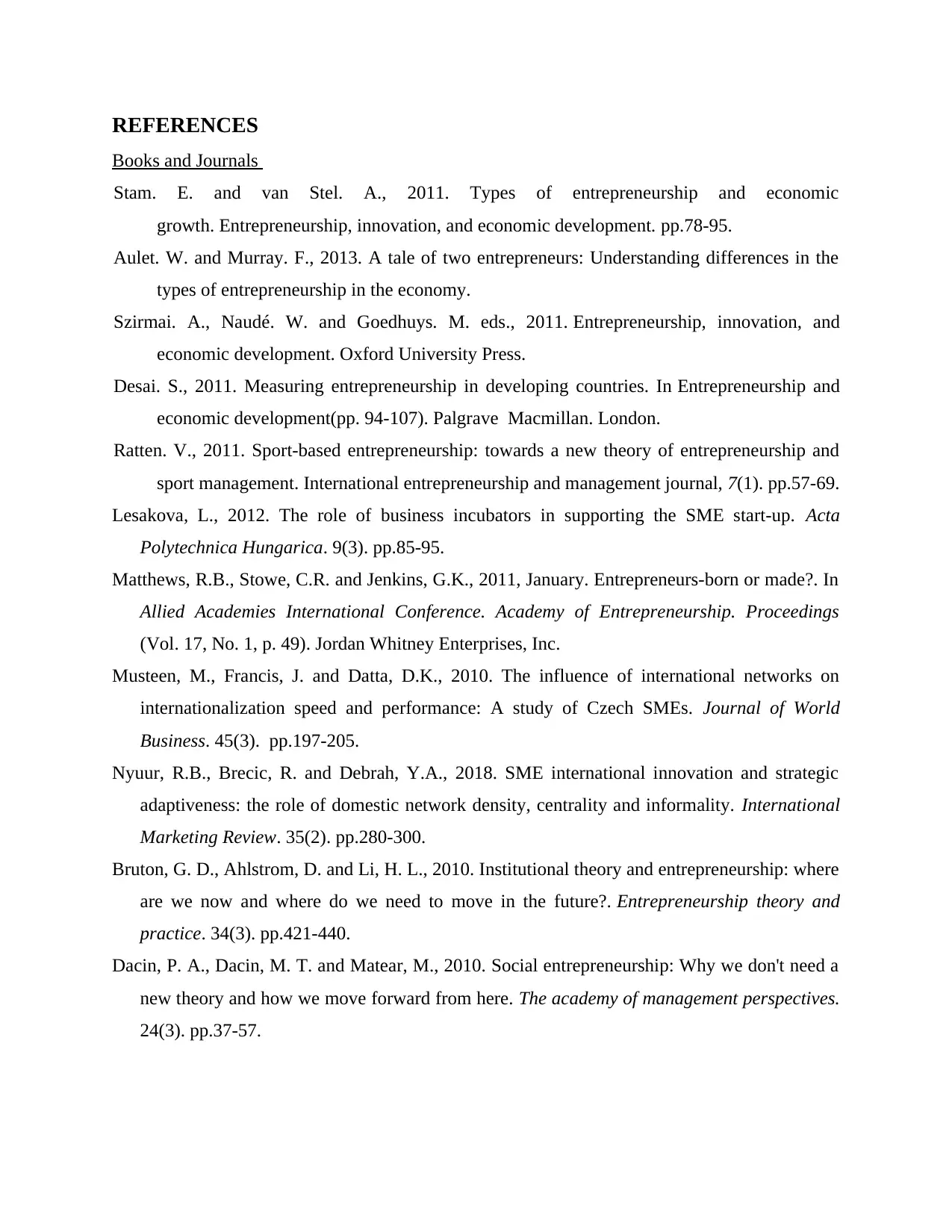
REFERENCES
Books and Journals
Stam. E. and van Stel. A., 2011. Types of entrepreneurship and economic
growth. Entrepreneurship, innovation, and economic development. pp.78-95.
Aulet. W. and Murray. F., 2013. A tale of two entrepreneurs: Understanding differences in the
types of entrepreneurship in the economy.
Szirmai. A., Naudé. W. and Goedhuys. M. eds., 2011. Entrepreneurship, innovation, and
economic development. Oxford University Press.
Desai. S., 2011. Measuring entrepreneurship in developing countries. In Entrepreneurship and
economic development(pp. 94-107). Palgrave Macmillan. London.
Ratten. V., 2011. Sport-based entrepreneurship: towards a new theory of entrepreneurship and
sport management. International entrepreneurship and management journal, 7(1). pp.57-69.
Lesakova, L., 2012. The role of business incubators in supporting the SME start-up. Acta
Polytechnica Hungarica. 9(3). pp.85-95.
Matthews, R.B., Stowe, C.R. and Jenkins, G.K., 2011, January. Entrepreneurs-born or made?. In
Allied Academies International Conference. Academy of Entrepreneurship. Proceedings
(Vol. 17, No. 1, p. 49). Jordan Whitney Enterprises, Inc.
Musteen, M., Francis, J. and Datta, D.K., 2010. The influence of international networks on
internationalization speed and performance: A study of Czech SMEs. Journal of World
Business. 45(3). pp.197-205.
Nyuur, R.B., Brecic, R. and Debrah, Y.A., 2018. SME international innovation and strategic
adaptiveness: the role of domestic network density, centrality and informality. International
Marketing Review. 35(2). pp.280-300.
Bruton, G. D., Ahlstrom, D. and Li, H. L., 2010. Institutional theory and entrepreneurship: where
are we now and where do we need to move in the future?. Entrepreneurship theory and
practice. 34(3). pp.421-440.
Dacin, P. A., Dacin, M. T. and Matear, M., 2010. Social entrepreneurship: Why we don't need a
new theory and how we move forward from here. The academy of management perspectives.
24(3). pp.37-57.
Books and Journals
Stam. E. and van Stel. A., 2011. Types of entrepreneurship and economic
growth. Entrepreneurship, innovation, and economic development. pp.78-95.
Aulet. W. and Murray. F., 2013. A tale of two entrepreneurs: Understanding differences in the
types of entrepreneurship in the economy.
Szirmai. A., Naudé. W. and Goedhuys. M. eds., 2011. Entrepreneurship, innovation, and
economic development. Oxford University Press.
Desai. S., 2011. Measuring entrepreneurship in developing countries. In Entrepreneurship and
economic development(pp. 94-107). Palgrave Macmillan. London.
Ratten. V., 2011. Sport-based entrepreneurship: towards a new theory of entrepreneurship and
sport management. International entrepreneurship and management journal, 7(1). pp.57-69.
Lesakova, L., 2012. The role of business incubators in supporting the SME start-up. Acta
Polytechnica Hungarica. 9(3). pp.85-95.
Matthews, R.B., Stowe, C.R. and Jenkins, G.K., 2011, January. Entrepreneurs-born or made?. In
Allied Academies International Conference. Academy of Entrepreneurship. Proceedings
(Vol. 17, No. 1, p. 49). Jordan Whitney Enterprises, Inc.
Musteen, M., Francis, J. and Datta, D.K., 2010. The influence of international networks on
internationalization speed and performance: A study of Czech SMEs. Journal of World
Business. 45(3). pp.197-205.
Nyuur, R.B., Brecic, R. and Debrah, Y.A., 2018. SME international innovation and strategic
adaptiveness: the role of domestic network density, centrality and informality. International
Marketing Review. 35(2). pp.280-300.
Bruton, G. D., Ahlstrom, D. and Li, H. L., 2010. Institutional theory and entrepreneurship: where
are we now and where do we need to move in the future?. Entrepreneurship theory and
practice. 34(3). pp.421-440.
Dacin, P. A., Dacin, M. T. and Matear, M., 2010. Social entrepreneurship: Why we don't need a
new theory and how we move forward from here. The academy of management perspectives.
24(3). pp.37-57.
Secure Best Marks with AI Grader
Need help grading? Try our AI Grader for instant feedback on your assignments.
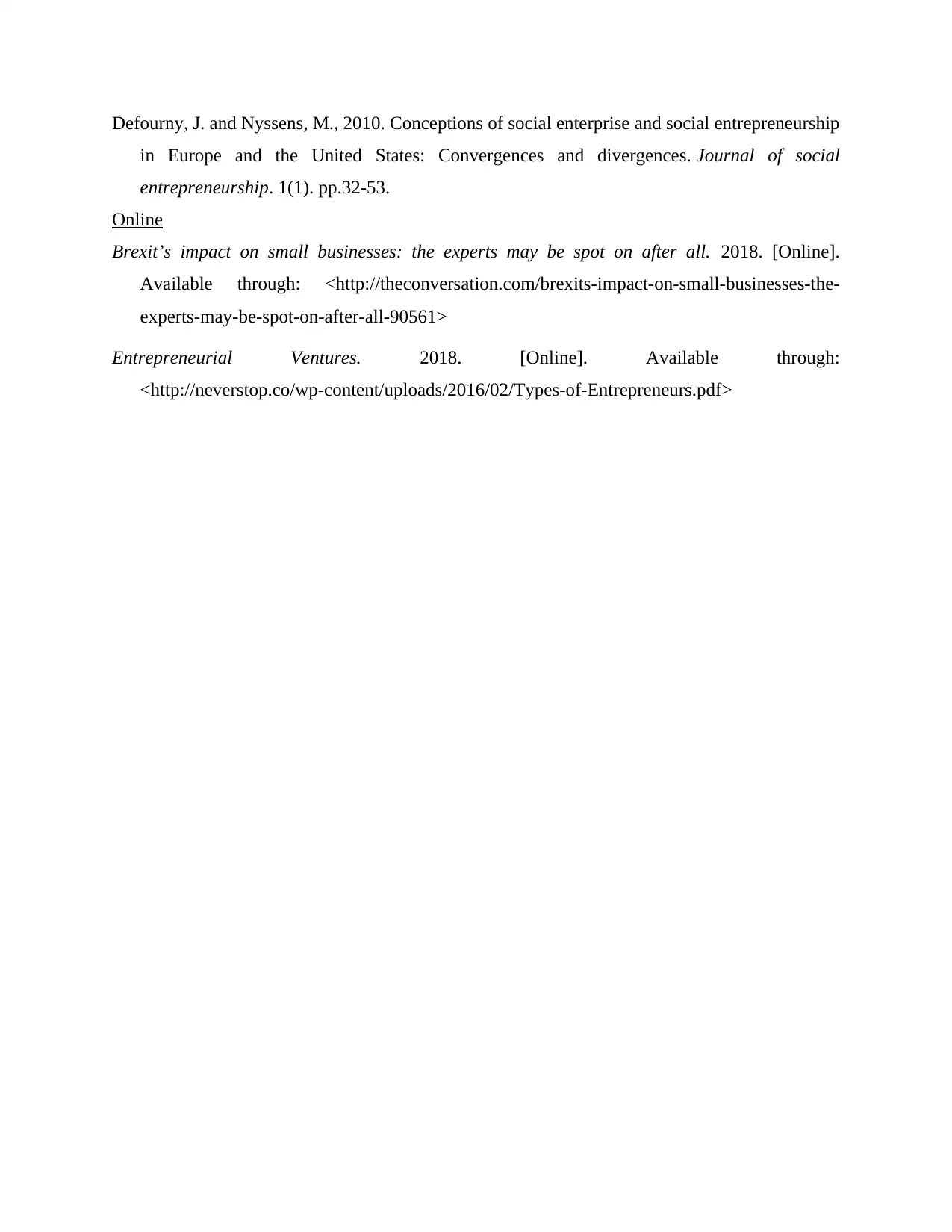
Defourny, J. and Nyssens, M., 2010. Conceptions of social enterprise and social entrepreneurship
in Europe and the United States: Convergences and divergences. Journal of social
entrepreneurship. 1(1). pp.32-53.
Online
Brexit’s impact on small businesses: the experts may be spot on after all. 2018. [Online].
Available through: <http://theconversation.com/brexits-impact-on-small-businesses-the-
experts-may-be-spot-on-after-all-90561>
Entrepreneurial Ventures. 2018. [Online]. Available through:
<http://neverstop.co/wp-content/uploads/2016/02/Types-of-Entrepreneurs.pdf>
in Europe and the United States: Convergences and divergences. Journal of social
entrepreneurship. 1(1). pp.32-53.
Online
Brexit’s impact on small businesses: the experts may be spot on after all. 2018. [Online].
Available through: <http://theconversation.com/brexits-impact-on-small-businesses-the-
experts-may-be-spot-on-after-all-90561>
Entrepreneurial Ventures. 2018. [Online]. Available through:
<http://neverstop.co/wp-content/uploads/2016/02/Types-of-Entrepreneurs.pdf>
1 out of 17
Related Documents
Your All-in-One AI-Powered Toolkit for Academic Success.
+13062052269
info@desklib.com
Available 24*7 on WhatsApp / Email
![[object Object]](/_next/static/media/star-bottom.7253800d.svg)
Unlock your academic potential
© 2024 | Zucol Services PVT LTD | All rights reserved.




